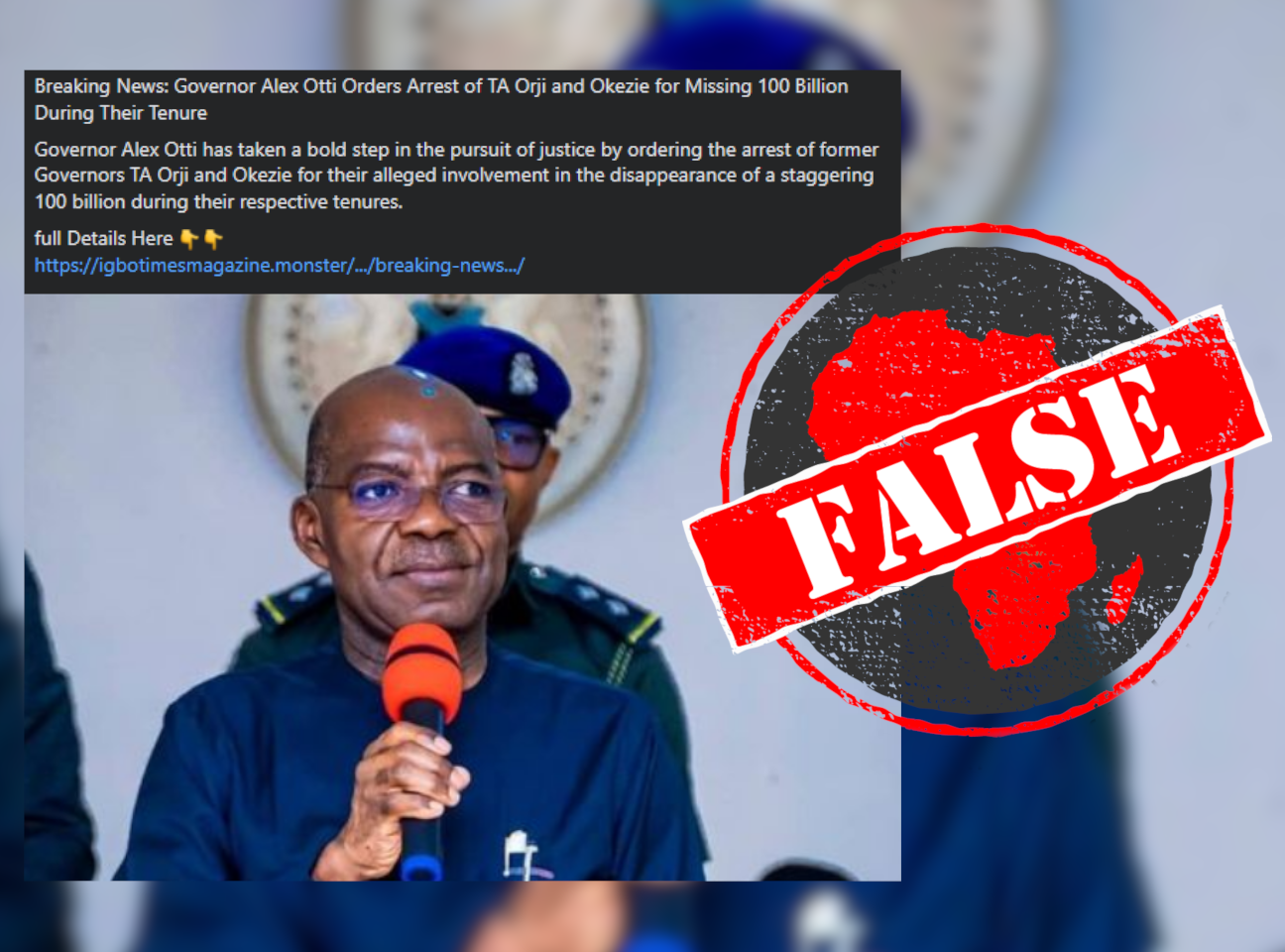IN SHORT: A message circulating on Facebook in Nigeria claims Abia state governor Alex Otti has ordered the arrest of his predecessors – Okezie Ikpeazu and Theodore Orji. But there is no evidence to support this claim.
A “breaking news” report posted on Facebook claims that Alex Otti has ordered the arrest of his predecessors over funds that allegedly went missing during their tenures. Otti is the governor of Abia state in south-east Nigeria.
The Facebook post starts with the headline: “Breaking News: Governor Alex Otti Orders Arrest of TA Orji and Okezie for Missing 100 Billion During Their Tenure.”.
“Governor Alex Otti has taken a bold step in the pursuit of justice by ordering the arrest of former Governors TA Orji and Okezie for their alleged involvement in the disappearance of a staggering 100 billion during their respective tenures,” reads the post on a public Facebook group with over 34,700 members.
Theodore Orji was governor of Abia from 2007 to 2015. Okezie Ikpeazu succeeded Orji in 2015 and served until 2023.
The post does not specify what currency the “100 billion” is. We assume it is in naira, Nigeria’s official currency.
It includes a link to a report and photos of Otti, Orji, Ikpeazu and operatives of the Economic and Financial Crimes Commission (EFCC), published on a buggy blog by the name “Igbo Times Magazine”. The commission is responsible for combating financial crime in the country.
The same claim can be found here, here and here.
Otti has been in the news for various reasons since he took office in May 2023. He has earned a reputation for taking bold steps, including supporting the launch of the new Aba integrated power project and cancelling the pensions of ex-governors.
But has he ordered the arrest of his predecessors? We checked.

Probe ongoing, no evidence of an order to arrest ex-governors
In June, Otti set up a judicial panel of inquiry to probe and recover government property withheld by officials of the Ikpeazu administration.
Ikpeazu tried to stop the investigation with a court order, but the panel began its work in August.
The panel has ordered the arrest of the state’s former accountant-general, Kelechi Imeoria, and Ikpeazu’s chief of staff, Prof Anthony Agbazuere. Both were invited to appear before the panel over the withholding of government vehicles but failed to appear.
But neither the panel nor Otti has invited Ikpeazu or ordered his arrest. If they did, it would make headlines.
In February 2024, Africa Check debunked a claim that the EFCC had discovered US$800 million in Ikpeazu’s home. Ikpeazu is reportedly being investigated by the EFCC.
The panel set up by Otti is not looking as far as Orji’s tenure. It is unlikely that it will invite Orji or order his arrest.
In August 2021, the EFCC arrested and detained Orji and his son on charges of misappropriation of public funds and money laundering. The commission reopened the case against Orji in January 2024.
We also found no evidence of Otti talking about a missing N100 billion during the tenures of Orji and Ikpeazu.
The claim is false.
Republish our content for free
For publishers: what to do if your post is rated false
A fact-checker has rated your Facebook or Instagram post as “false”, “altered”, “partly false” or “missing context”. This could have serious consequences. What do you do?
Click on our guide for the steps you should follow.
Publishers guideAfrica Check teams up with Facebook
Africa Check is a partner in Meta's third-party fact-checking programme to help stop the spread of false information on social media.
The content we rate as “false” will be downgraded on Facebook and Instagram. This means fewer people will see it.
You can also help identify false information on Facebook. This guide explains how.


Add new comment